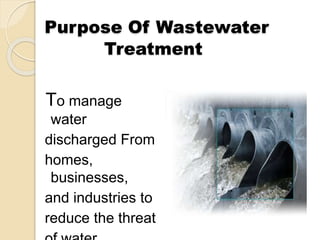Primary waste water treatment powerpointb presntation
- 1. PRIMARY WASTE WATER TREATMENT SUBMITTED BY KANCHAN B.Tech 3RD YEAR(CE) BANASTHALI UNIVERSITY
- 2. WHAT IS WASTE WATER? Wastewater is a liquid waste ,which consists of animal, vegetable or chemical matter in water. Waste water contain pathogens(disease causing organisms). It must be treated before it can be used or released back into the environment.
- 3. 5 major Sources of waste water Insdustrial Irrigation Domestic/Residential Public Supplied Industrial,Commercial Mining
- 4. Purpose Of Wastewater Treatment To manage water discharged From homes, businesses, and industries to reduce the threat of water
- 5. 3 Stages Of Wastewater Treatment Primary Treatment Secondary Treatment Tertiary Treatment
- 6. PRIMARY TREATMENT -Typical Materials That Are Removed During Primary Treatment Include # Fats, Oils, And Greases (Aka FOG) #Sand, Gravels And Rocks (Aka Grit) #Larger Settleable Solids Including Human Waste, And Floating Materials . - Protects Pumps And Equipment From Damage
- 7. METHOD USE IN PRIMARY TREATMENT Screening Comminutar Grit removal Primary sedimentation
- 8. SCREENING Screening Devises Are Used To Remove Solids From Waste Water. Solids Consists Of Sticks, rags, boards And Other Large Object.
- 9. TYPES OF SCREENS SCREENS Coarse screens 6 to 50mm Hand cleaned Microscreens <0.5 micrometer Mecanically cleaned Reciprocating rake screen Fine screens <6 mm drum Staic wedge wire
- 10. COARSE SCREEN THESE TYPE OF SCREEN ARE USED TO PROTECT PUMPS , VALVES AND PIPELINES FROM DAMAGE OR CLOGGING BY RAGS AND LARGE OBJECTS.
- 11. HAND CLEANED CORSE SCREEN They Are Also Known As Bar Screens. Bar Spacing Traditionally Of Approximately 6 To 50mm And Inclined At 45° To 60° To The Flow. Screens Are Cleaned Manually If The Object Caught Is Larger. The Main Advantage Is That No Power Required. The Main Disadvantage Is That Manual Labour
- 12. MECHANICALLY CLEANED SCREENS RECIPROCATING RAKE(CLIMBER) SCREEN The advantage is that parts which required maintenance are above water line. The disadvantage is that screen may have limited capacity in handling heavy screenings loads.
- 13. MICROSCREENS The Filter Fabrics Have Openings Of <0.5 micrometer And Are Fitted On The Drum Periphery. The Waste Water Enters The Open End Of The Drum And Flows Outward Through The Rotating Drum Screening Cloth. These Type Of Screen Are Used In Secondary Treatment.
- 14. FINE SCREENS 1. STATIC WEDGE WIRE They Have 0.2 To 1.2mm Clear Openings And Are Designed For Flow rates Of About 400 To 1200 L/m2.min.Head Loss Ranges From 1.2 To 2 m.
- 15. 2. DRUM SCREEN THE SCREENING MEDIUM MOUNTED IS MOUNTED ON A CYLINDER THAT ROTATES IN A FLOW CHANNEL.THE WASTEWATER FLOWS INTO ONE END OF THE DRUM AND OUTWARD THROUGH THE SCREEN WITH SOLID COLLECTION ON THE INTERIOR SURFACE.
- 16. COMMINUTOR A comminutor, also known as the grinding pump, cutting screen. This cutting screen shreds any large chunks of organic matter in the wastewater into smaller pieces. This prevents the large chunks from harming the internal workings of the treatment plant.
- 17. GRIT REMOVAL A grit is pieces of rock, metal, bone, and even egg shells, which are denser than organic materials, to settle out of the waste stream. Removal of grit prevents damage to machinery through abrasion or clogging.
- 18. GRIT CHAMBER In these type of chamber a constant flow rate is passed Through the chamber and the heavy particle of water settle down and collected in the bottom of the channel.
- 19. PRIMARY SEDIMENTATION Remove Organic Solid(oil,grease)from Waste Water. It Proceed Type 2 Settling. Organic Material Settles Down Usually In The Range 1 To 2.5m/Hr Sludge Should Be Remove Before Anaerobic Condition Develop.
- 20. CONCLUSION Through Primary Treatment,large Particle Or Inorganic Substances Are Removed From The Water.The BOD Present After Primary Treatment Is 140 mg/l And TSS 130 mg/l.



















